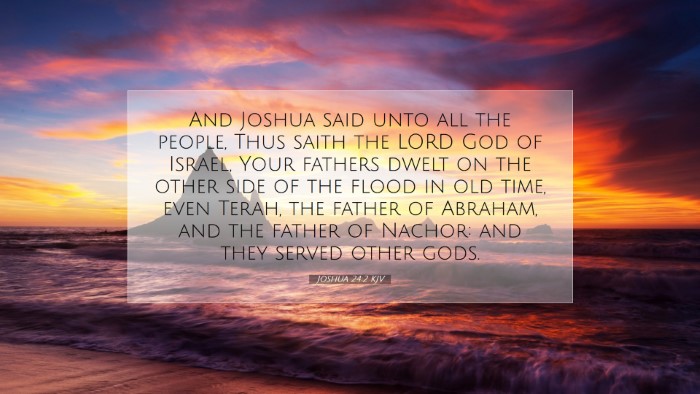Commentary on Joshua 24:2
Verse Context: Joshua 24:2 states:
"And Joshua said unto all the people, Thus saith the Lord God of Israel, Your fathers dwelt on the other side of the flood in old time, even Terah, the father of Abraham, and the father of Nachor: and they served other gods."
Introduction
This moment in Israel's history marks a significant transition. As Joshua is addressing the people, he recalls their roots and establishes the context for their covenant relationship with God. This commentary draws insights from multiple public domain sources, emphasizing the theological significance and applications of this verse.
Matthew Henry’s Insights
Matthew Henry emphasizes the significance of God's sovereignty and providence in the lives of the patriarchs. He notes that Joshua reminds the Israelites of their ancestors’ idolatries to highlight the grace of God in choosing them:
- Historical Reflection: Joshua begins his address by recalling the history of Israel, specifically pointing to their forefathers who lived in Ur of the Chaldeans. This serves not only as a reminder of their past but also as a means to provoke gratitude for God’s deliverance.
- Idolatry as a Warning: The mention of "serving other gods" serves to caution the people. Henry argues that this historical context emphasizes the importance of fidelity to God, underscoring that their current faithfulness is a stark contrast to their ancestors' unfaithfulness.
- Grace and Election: Henry highlights God's election of Abraham and his family despite their pagan background, signifying that divine grace is not constrained by human merit.
Albert Barnes’ Reflections
Albert Barnes sheds light on the implications of the verse for contemporary believers. He discusses the significance of Joshua's address as a call to remember and reflect:
- Remembrance: Barnes notes that Joshua's call to remember their ancestors serves a dual purpose: it encourages the Israelites to appreciate their heritage and serves as a warning against the repetition of past errors.
- Covenantal Context: He points out that the act of recounting their historical faithfulness serves to fortify the community’s commitment to keep the covenant established with God.
- God's Character: Barnes highlights the nature of God as a redeemer. Despite the idolatry of their ancestors, God’s choice of Abraham exemplifies His mercy and grace, reinforcing the theme that divine purposes transcend human failings.
Adam Clarke’s Analysis
Adam Clarke offers a detailed analysis of the cultural and historical aspects of the verse, enriching our understanding in several ways:
- Historical Context: Clarke produces a thorough examination of the geographical and sociological context of Terah, Abraham’s father, and the idolatrous environment they emerged from. This enhances the understanding of God’s choosing of Abraham as a foundational act of establishing a people for Himself.
- Spiritual Insight: Clarke emphasizes the importance of discernment regarding spiritual influences in their lives. He articulates that Joshua’s reminder of their pagan background calls for a deliberate separation from the practices of their forefathers.
- Call to Holiness: The reminder of past idolatry leads to a call for holiness. Clarke argues that the address of Joshua serves to encourage the Israelites to commit fully to serving the one true God, reinforcing the call to a holy lifestyle.
Theological Significance
This verse encapsulates several theological themes significant for understanding the character of God and His relationship with Israel:
- Grace and Election: The illustration of God choosing reckless ancients to form a nation reveals the essence of divine grace and the unmerited favor bestowed upon His people.
- Faithfulness in Covenant: The remembrance of past unfaithfulness juxtaposed with present grace serves as a powerful reminder for believers about the nature of covenant fidelity.
- Identity Formation: As Joshua outlines their history, he frames their identity not just as descendants of Abraham but as a chosen people set apart to worship Yahweh alone.
Practical Applications for Today
This verse prompts several applications that are critical for pastors, students, theologians, and scholars:
- Emphasizing History: Pastors can draw from this example by grounding teachings in the historical context of faith. Understanding the heritage of faith can bolster current faith practices.
- Encouraging Reflection: The remembrance of God's past mercies can be a foundational aspect of sermons that encourage congregants to reflect on their personal histories of faith.
- Guarding Against Idolatry: The call to abandon practices contrary to God also serves as a reminder for today’s believers to examine cultural influences that might detract from their commitment to God.
Conclusion
Joshua 24:2 serves as a clarion call for remembering the faithfulness of God throughout Israel's history. Through the lens of publicly available commentaries, we see profound insights that not only deepen our understanding of Israel's past but also challenge contemporary believers to live faithfully in response to God's enduring grace. This verse invites reflection upon our roots, accountability to our covenants, and a renewed commitment to serving the living God.


